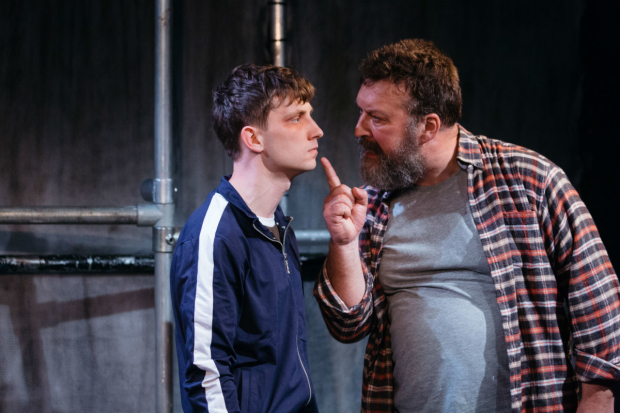Review: Isaac Came Home From the Mountain at Theatre 503
 |
| © Helen Murray |
Phil Ormrod’s Bruntwood-longlisted play is inspired by the biblical
story of sacrifice concerning Isaac and Abraham, but other than a focus on the
father-son relationship, the play diverges from the Old Testament tale. Indeed
the ending seems more reminiscent of the Prodigal Son than the Binding of Isaac.
We are greeted by a dimly lit grungy yard littered with scrap
metal, highlighted by an intense orange glow. We are not sure where we are, but
we are certainly very uneasy, thanks to Eleanor Bull’s moody set design and Ali
Hunter’s thoughtful lighting.
Central character Bobby (Charles Furness) is an angsty misunderstood
drop-out, who has fallen in with the wrong crowd in a semi-rural northern town.
His father John (Guy Porritt) is a policeman at his wits’ end from trying to
keep Bobby on the straight and narrow. Tired of being chastised for his misdemeanours
Bobby flees the family home to prove his worth and bring back an honest wage.
He soon falls into the clutches of two rather unsavoury characters,
sparring partner Chris (Kenny Fullwood) and his menacing father Mike (Ian
Burfield), both of whom successfully exude a hillbilly-esque quality. Mike, a
burly broad man of the land, is everything alpha male. He sees promise in Bobby,
the son he’s always wanted, and swiftly takes him under his wing to teach him
the importance of hard graft and perseverance through a series of tests. He
also encourages Bobby to consider methods of dealing with the local gang leader:
‘Real strength ain’t smacking someone: it’s making them flinch when they think
about you…’.
John is suspicious of his son’s new employers-cum-surrogate
family as Bobby becomes increasingly enmeshed in his new-found relationships
with Mike and Chris, although this does all feel like it’s happening a bit too quickly.
The sweltering epiphanic climax of the play sees young actor
Charles Furness come into his own with a painful emotional outpouring which
spans euphoria to despair as he realises the devastating consequences of his
actions. However, in the end, Bobby is forgiven all too easily by his father
for his serious wrongdoings, which is a little disappointing.
The success of the play comes from Ormrod’s honest and brutal
examination of frustrated father-son relationships. We are bombarded by media
stories about disillusioned knife-wielding young men, whose seemingly random
acts of violence are often explained away by boredom, poverty, drugs or gang
warfare. Ormrod intriguingly proposes that often the root cause of such
problems is in the father-son bond.
We are obliged to contemplate how dysfunctional their
relationship must be for Bobby to declare about his father: ‘I don’t care if he
lives or dies!’ However we are also left with unanswered questions. We want to
know more about John and Mike’s history. And Chris seems almost paralysed by
his father’s controlling behaviour but we never fully understand why. Plus the
absence of any female characters is a curious omission but perhaps this is true
to the world Ormrod wants to depict.
Although the testosterone-fuelled fight scenes felt a little
constrained at times every inch of the space is used well thanks to fight
choreographer Mark Conway and movement director Nancy Kettle. Several of the
gasp-inducing tussles, slaps and rough shoves felt very masculine and tantalisingly
real.
Director Carla Kingham effectively captures the repressed
and limited emotional register of this particular type of man/boy, although
this inevitably gives the play as a whole a one-note quality. In a world where
sons fail to meet their fathers’ unrealistic expectations, and are forbidden to
express their vulnerability, we vividly see the damaging consequences.
Cocoa's verdict: It's okay if you like stuff solely about the male gender.
Cocoa's verdict: It's okay if you like stuff solely about the male gender.
⭐⭐⭐
Running time: 70mins

Comments
Post a Comment